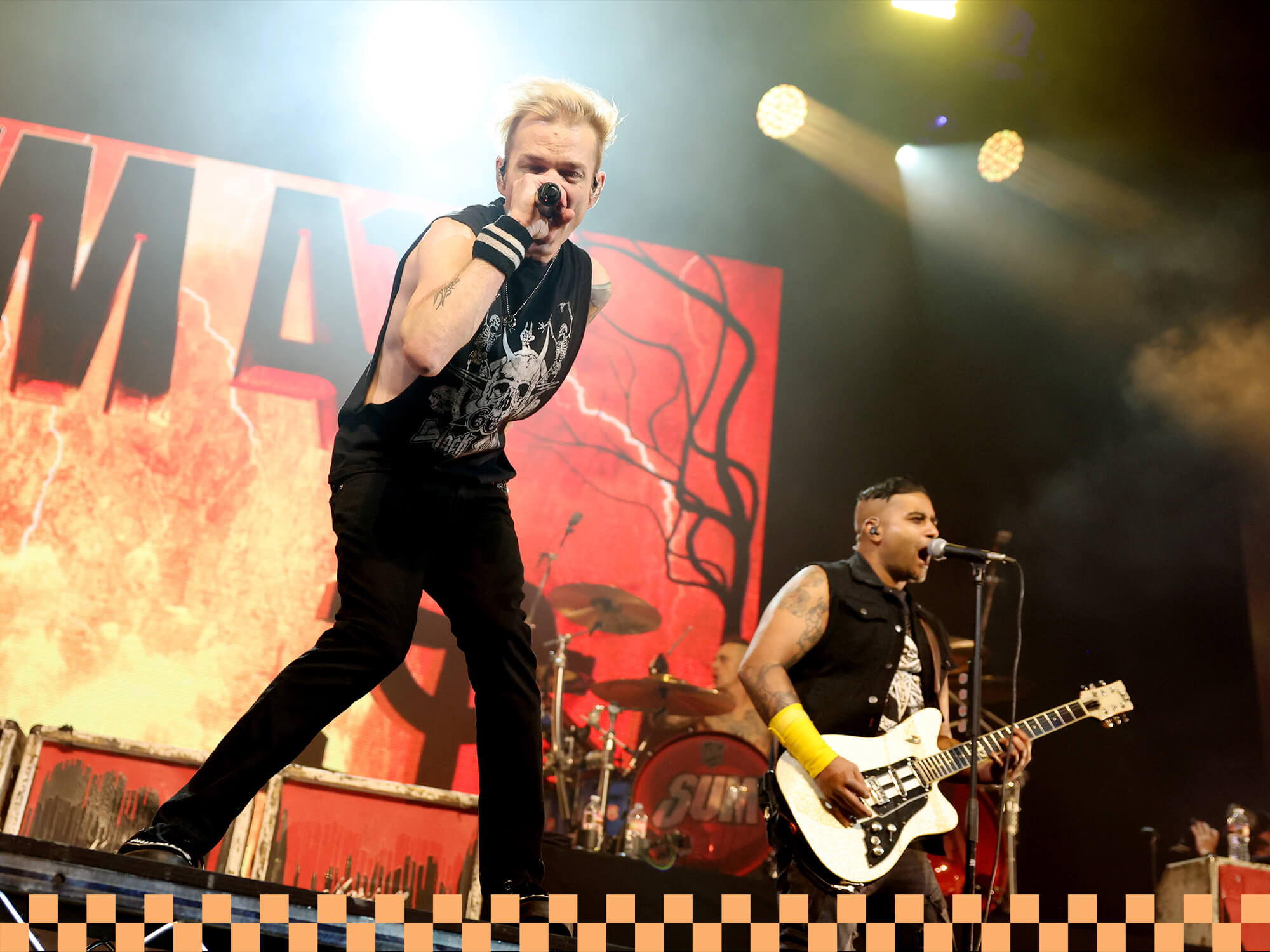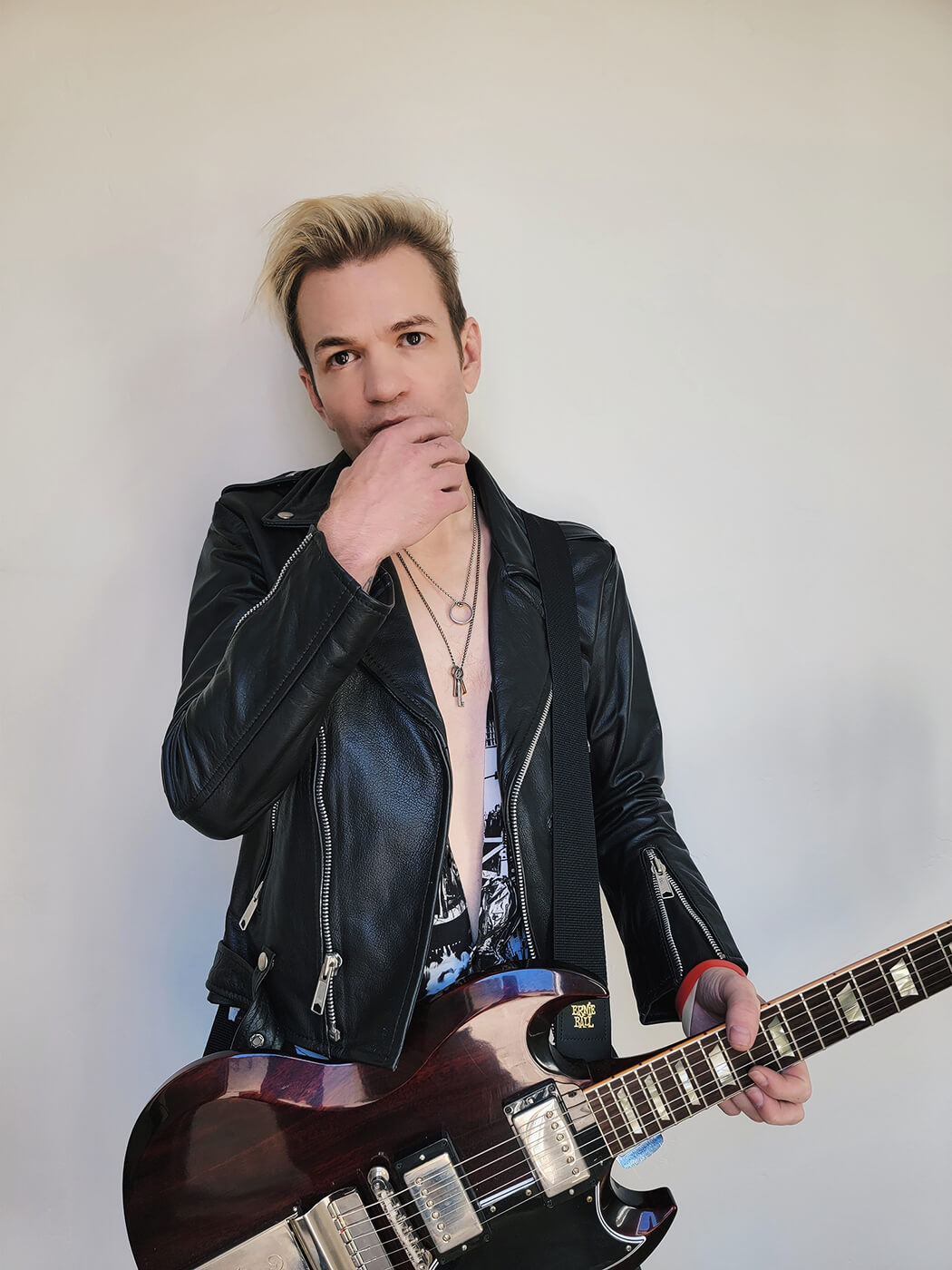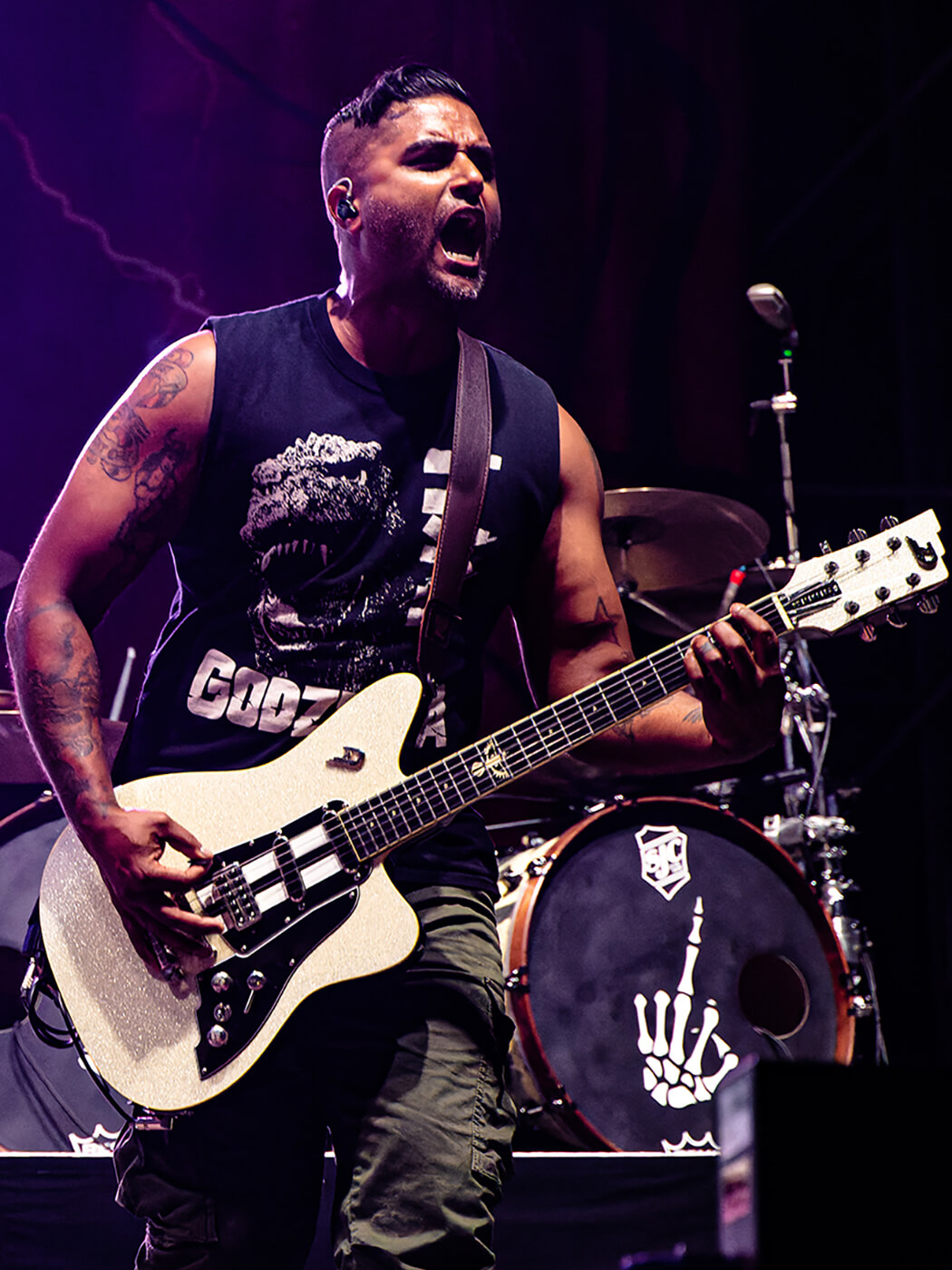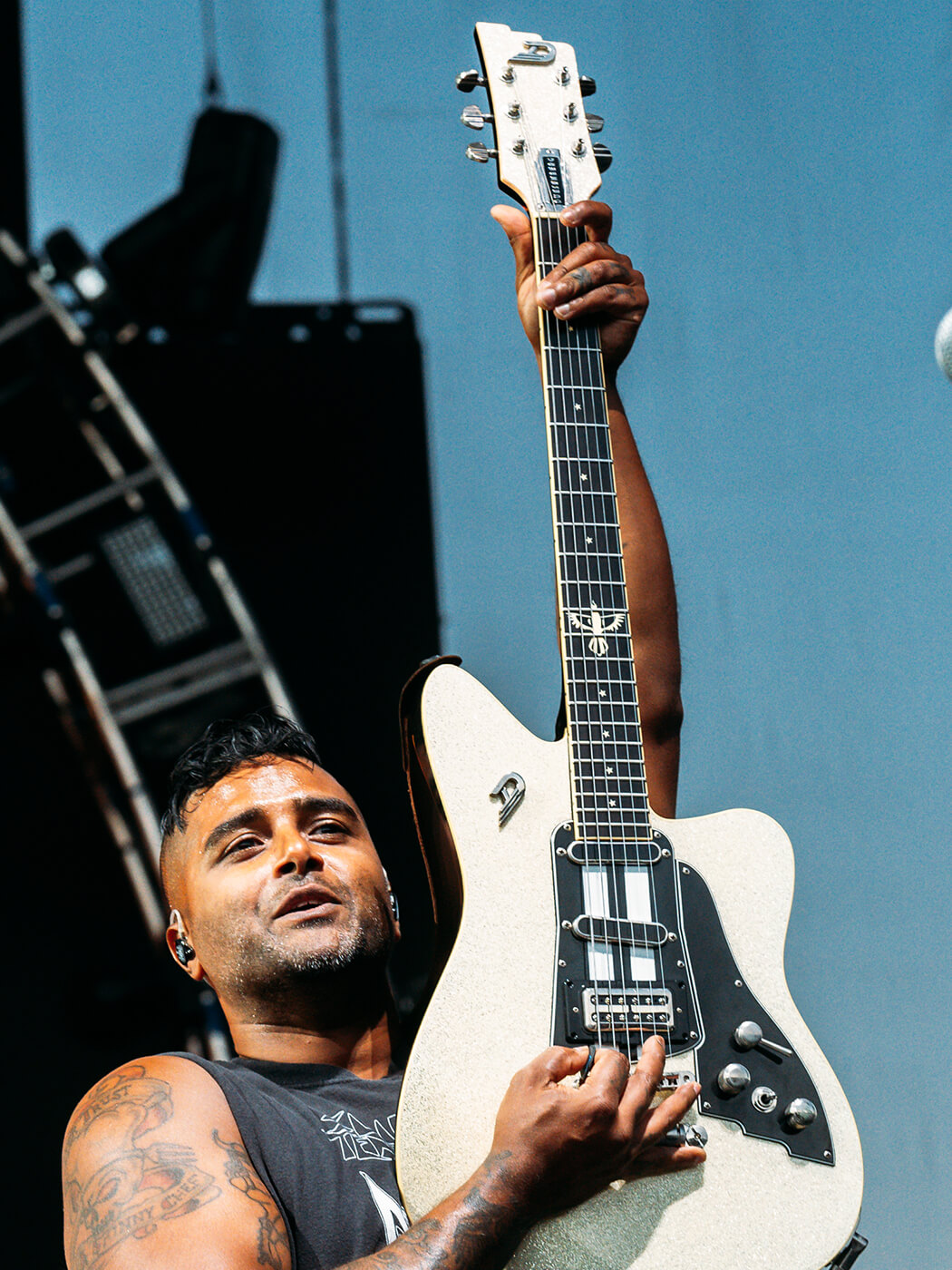Sum 41 on their swansong: ”We’re all, seriously, having the time of our lives right now”
As the pop-punkers prepare to bow out with a farewell tour and a series of festival shows, we caught up with the band’s two-prong guitar attack to talk Metallica, AC/DC, their final album, and making sure every night feels like the last one…

Deryck Whibley and Dave Baksh of Sum 41 performing at iHeartRadio ALTer EGO in 2024. Image: Rich Polk/Getty Images for iHeartRadio
Dave Baksh opened his email inbox one day to find something that startled him. There was a message with the subject line beginning ‘There’s no easy way to say this…’ He panicked for a moment. Was he being fired? He racked his brain – what could he have done to jeopardise his position in Sum 41?
In actuality, he wasn’t being fired, but nonetheless, his time in Sum 41 was going to end. The band’s frontman and rhythm guitarist Deryck Whibley had decided it was time to shut up shop after just over two decades of adrenaline, tours and riffs. The album they had just made together would be their last.
- READ MORE: The Aristocrats’ Guthrie Govan on digital amps, effects and “a certain kind of weird note choice”
“The message he conveyed was beautifully written, and I think due to the friendship and relationship we’ve had over the years, immediately I was like, ‘Whatever you need. This isn’t the end of us being in each other’s lives, this is just the end of one of the chapters,” Dave says. “It was emotional of course, but I love him and I get it. I’d rather he be in a place where he feels like he can live the life that he’s earned.”
The news came to Dave as a surprise, but the seed had been planted in Deryck’s head for some time. Every so often, he’d chew over the possibility of doing something different with his life – a solo record, perhaps, or just anything besides the day job that eaten most of the last two decades of his life. Making it happen, however, seemed impossible when Sum 41 demanded so much of him.
“I’d get home and say, ‘I’m taking a year off, don’t call me, I don’t want to hear anything about Sum 41’,” Whibley reflects. “Then two weeks later, I’d get a call from management and they’d say, ‘We know you didn’t want to hear anything but we had to let you know about this offer, this festival, this and that.’”

Exit Ramp
By 2018 or so, Deryck realised that the demand for Sum 41 was so inescapable that he would have to end the band to create space for other things. “I would bury that thought and move on and not think about it for three, four months, and then it would creep back in,” he continues. He even thought the pandemic would be the thing that would brush those thoughts under the carpet for good. “It really was a saving grace for me, because I was burning out.”
In his mind, the enforced break would give him a chance to spend time with his new young family, be just Deryck rather than Deryck from Sum 41 for a while, and then he’d be so hungry to get back on stage once again that he’d never contemplate changing anything again. Nope. Two weeks later, the thoughts of leaving were back. Eventually, it was all he could think about.
It was making their new album, Heaven :x: Hell, that gave Deryck the opportune moment to float the possibility of wrapping Sum 41 up. A sprawling double album showcasing the entire spectrum of their sound, with one punk half and one metal half, it felt like the perfect conclusion to their career that was executed on their own terms. Its genesis came out rather unconsciously.
“I didn’t know it was an album until there were 17 songs finished already,” Deryck says – but the band were so pleased with the quality of what came out that cutting it down to a slimmer single album felt too painful. Instead, they just rolled with it. “I’m surprised we’re the first Canadian rock band to ever do it,” adds Dave. “If you look at a lot of Canadian punk rock tours, they do have that dichotomy of melodic and very heavy.”

Scratch Fever
The album’s first half found Deryck delving back into the scratchy, rough yet quintessentially upbeat sounds of Sum 41’s defining – and best known – earlier albums. Although they’d conveniently fallen back in vogue following the pandemic, they weren’t reaching for the cheap trick of playing into the outstretched hands of nostalgia.
“I started writing these songs before the pop punk resurgence,” he clarifies. Then again, that movement is something he’s not been especially conscious of in recent years. “I’m really bad at paying attention to a lot of that stuff. I sort of live in my own world and I’ll peripherally see things that happen, but I’m not really one to check out new artists and see who’s doing what.”
In fact, Deryck rediscovered punk during the pandemic when he got to hear it through new ears by playing it to his young son. He’d drive around LA with his family to kill time, making the most of the eerily empty roads that in normal times would have thousands of cars sat there idling in snaking traffic jams. When his son cried in the backseat, he found that he could soothe him with the punk bands that soundtracked his childhood – NOFX, Strung Out, Lagwagon, Pennywise, Bad Religion, Social Distortion. It was as if he had punk in his blood.
As such, having gone from not listening to those bands for years to hearing them every day, they inevitably shaped what he ended up writing.
“The other thing that was weird was that I remember saying to my wife that when lockdown started, I had no responsibilities. I didn’t have to be anywhere, nobody was calling, nobody was emailing,” he considers. “I kept saying, ‘I haven’t felt like this since I was 18’. I had this period where I wrote these first records, I had no responsibilities, then we got signed and I had no free time ever again.”

Athletic Prowess
Consequently, it means that in a way, Sum 41 have come full circle for their final album. Their past sounds became the present again, rubbing shoulders with the heavier sounds that would define their back catalogue as they grew up. When asked what they feel those dual sounds have in common, and how they so naturally coalesce, Deryck points to their energy and aggression. “I don’t see much difference in some of the stuff on [Metallica’s 1981 debut] Kill ‘Em All to some punk stuff that came out at the same time. I’m a pretty calm, quiet, shy person but there’s a part of me that loves aggressive, hard, loud, fast music even though that person doesn’t come out of me externally.”
“As a guitar player, heavy metal is one of the most fun ventures into music because it’s almost like your forearms have to be the forearms of an athlete but the rest of you can be a total piece of shit!” Dave agrees.
The desire to recapture that punk spirit also ended up shaping what they did with the guitars. “The tones are sludgy, like a Discharge record!” Dave enthuses. That all was made possible by happenstance when Dave stumbled across some gear he estimates he’d been “in 20 feet of” for his entire career. It turned out to be a profile of the Jessica Kill tone on a Kemper made with a Plexi mod – “It’s versatile enough to play chords and has a great amount of punch and attack to it without eating up too much of the room for the bass.”
Conveniently, it was also the ideal sound for his shiny new Duesenberg signature, whose black and white theme was inspired by his favourite UK football club Newcastle United. “Before I returned to Sum 41, I’d gone to a shop and picked up a Duesenberg that sounded like an old Gretsch that was released in the early 2000s,” he recalls. “It was such a great guitar – I used it for pre-production on [2019 album] Order In Decline and I’d been chasing it ever since. Duesenberg attracted me because they look like hot rods, so I reached out and tried to get in touch with them but nobody would call me back because they’re making guitars for Joe Walsh, Johnny Depp, people that are way out of my league.
“I eventually did an interview in Berlin and the interviewer knew the rep. Chris from Duesenberg came up with the idea for me to design a signature guitar and I was floored because I have never put out a signature guitar that goes to retail with a company because everybody wanted to make a cheaper version that had my name on it. But that doesn’t make sense to me. If I’m buying an Angus Young guitar, I want it to be the guitar that Angus Young plays. So this was the first company that was offering up that type of quality and, and I just had to go with it.”
Deryck, meanwhile, relied on his old faithfuls in the form of a series of classic Gibson Les Pauls. “I got into Les Pauls because of Slash,” he says. “When I started playing guitar, Guns N’ Roses and Nirvana were the biggest bands in the world. I wanted to be a guitar player like Slash at first and a songwriter like Kurt Cobain. I do not play like Slash, but I found my thing was writing rather than shredding. I’ve always looked at our sound as like AC/DC plus, a little more saturated than AC/DC but rooted in those kinds of chords, a little more distorted, sped up a little more.”
The Last Dance
Past the end of Sum 41’s tour, it’s hard to imagine Deryck, or any of his bandmates, putting down their guitars for good. Then again, their own individual futures in music or elsewhere beyond their send-off in January 2025 haven’t quite been decided yet. Their last press cycle as a band, nor their last run of shows, feel quite final yet. “You have to remember, ‘Oh wait, this is the last night for these people,’” says Deryck. “I don’t remember that sometimes till the very end when you say, ‘Alright, we’ll see you next year’, and then I’m like ‘Oh no, we won’t.’”
Nonetheless, everything is finite now. The shows they’re playing across the world from now till the start of next year feel different. Both in their final album and their last run of shows, it’s the approaching end that means they’re doing everything with a renewed lease of life.
“Every single concert has this absolute dedication to what we’re doing and lightheartedness and a fun that, I think really, truly has been missing for the past five to six years,” says Dave. “It’s just such a beautiful thing. We’re all, seriously, having the time of our lives right now.”
